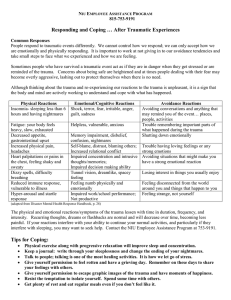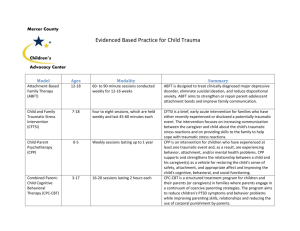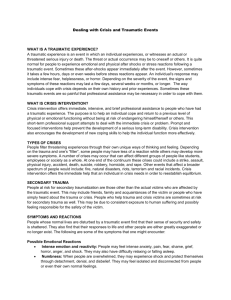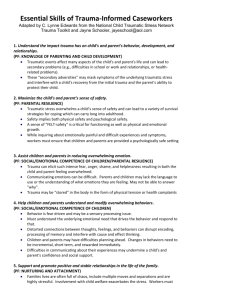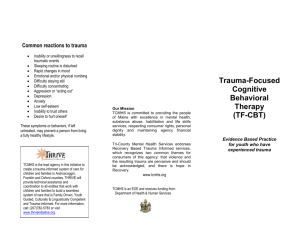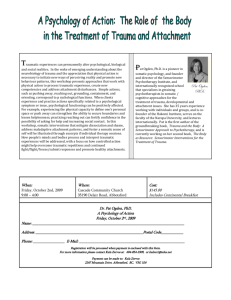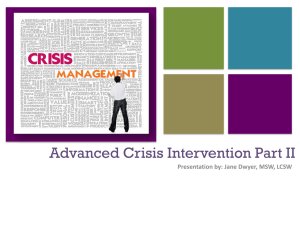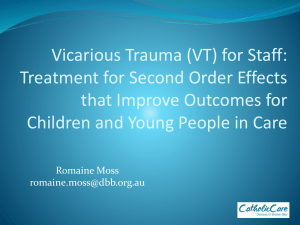Trauma and Learning for Faculty
advertisement
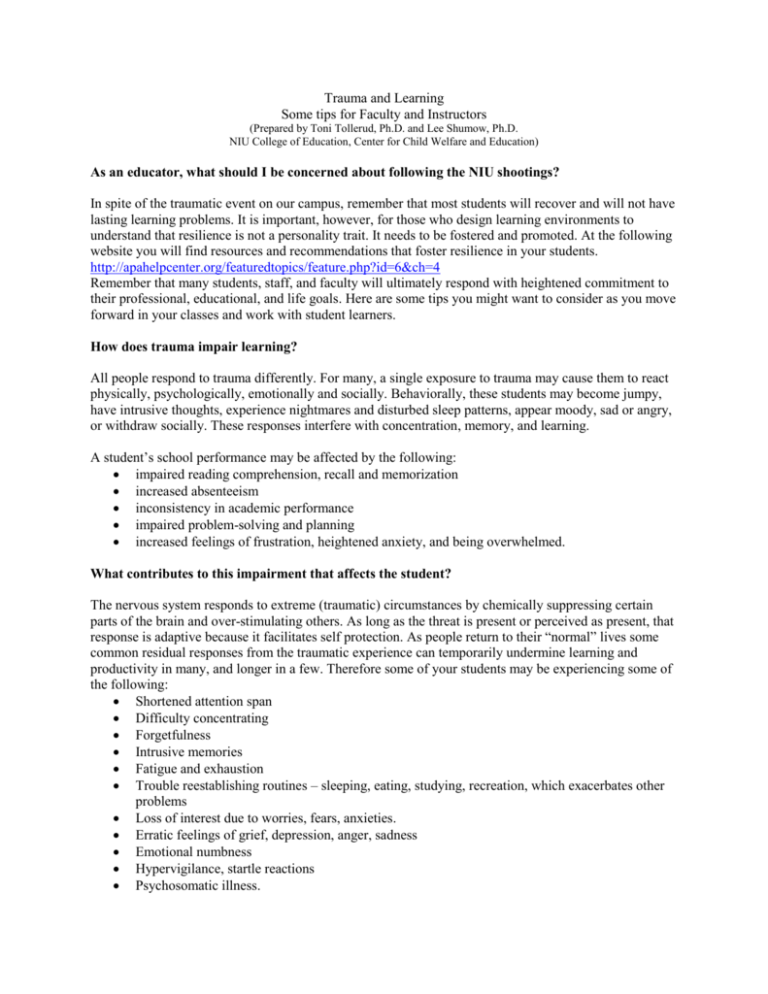
Trauma and Learning Some tips for Faculty and Instructors (Prepared by Toni Tollerud, Ph.D. and Lee Shumow, Ph.D. NIU College of Education, Center for Child Welfare and Education) As an educator, what should I be concerned about following the NIU shootings? In spite of the traumatic event on our campus, remember that most students will recover and will not have lasting learning problems. It is important, however, for those who design learning environments to understand that resilience is not a personality trait. It needs to be fostered and promoted. At the following website you will find resources and recommendations that foster resilience in your students. http://apahelpcenter.org/featuredtopics/feature.php?id=6&ch=4 Remember that many students, staff, and faculty will ultimately respond with heightened commitment to their professional, educational, and life goals. Here are some tips you might want to consider as you move forward in your classes and work with student learners. How does trauma impair learning? All people respond to trauma differently. For many, a single exposure to trauma may cause them to react physically, psychologically, emotionally and socially. Behaviorally, these students may become jumpy, have intrusive thoughts, experience nightmares and disturbed sleep patterns, appear moody, sad or angry, or withdraw socially. These responses interfere with concentration, memory, and learning. A student’s school performance may be affected by the following: impaired reading comprehension, recall and memorization increased absenteeism inconsistency in academic performance impaired problem-solving and planning increased feelings of frustration, heightened anxiety, and being overwhelmed. What contributes to this impairment that affects the student? The nervous system responds to extreme (traumatic) circumstances by chemically suppressing certain parts of the brain and over-stimulating others. As long as the threat is present or perceived as present, that response is adaptive because it facilitates self protection. As people return to their “normal” lives some common residual responses from the traumatic experience can temporarily undermine learning and productivity in many, and longer in a few. Therefore some of your students may be experiencing some of the following: Shortened attention span Difficulty concentrating Forgetfulness Intrusive memories Fatigue and exhaustion Trouble reestablishing routines – sleeping, eating, studying, recreation, which exacerbates other problems Loss of interest due to worries, fears, anxieties. Erratic feelings of grief, depression, anger, sadness Emotional numbness Hypervigilance, startle reactions Psychosomatic illness. As an instructor, what are some ways I could respond to the students in my classes? Help students set and prioritize goals for completing course work. Provide a stimulating but calm environment. Model a belief in healing. Realize you might have to repeat things. Communicate essential information in writing so students can refer to it if they were not concentrating (post on blackboard or email). Consider allowing some assignments to be late (within bounds). Consider relaxing criteria for incompletes this semester. Students need to make their own meaning out of these events but many professors teach content or analytical skills that, in a broad sense, will help students make sense of or put their experience in broader perspective. Model self care (you, too have been exposed to traumatic stress). Assist students by providing or helping them to develop learning and memory aides as appropriate. What about students who might be at a heightened risk? Some traumatic experiences occur once in a lifetime, but others are chronic. For some students, the trauma they have experienced on campus may trigger strong memories of previous trauma they have endured. This may also have a strong impact on students with existing medical or mental health conditions or on students who are experiencing other major stressors in their lives. These students may have additional difficulties in the classroom. What suggestions can I make? Talk to your students and educate about the impact of trauma they are experiencing Talk about safety and help students re-establish a sense of safety Suggest techniques for dealing with overwhelming emotional feelings or reactions (relaxation, deep breathing, self-talk) Refer the student for counseling at CSDC in the Campus Life Building, the Counseling Lab in Graham Hall, the Psychological Services Center in the Psychology-Computer Science Building, the Family Center in Wirtz Hall, or to a professional they are comfortable with. Information is also available on the following NIU webpage: http://www.niu.edu/memorial/counseling/index.shtml Watch for signs of any of the following behaviors: nightmares or intrusive memories Possible substance abuse (including alcohol) Depression (Clinically) Panic attacks or paralyzing worries Extreme anger or irritability Any other reactions you perceive as extreme or undermining the student’s functioning Suggestions on how to talk to a student who is distressed: http://www.niu.edu/facdev/resources/quicktips/transcripts/emotionaldistress.shtml What else? Be aware that you were also affected by what has happened on campus. Use good self-care, get your own rest so you are ready to work effectively with your students. Contact the Employee Assistance Office for additional assistance, resources, or counseling.
